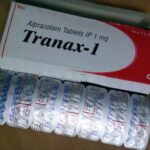Alprazolam: Uses, Side Effects, Addiction

What is alprazolam?
Alprazolam is in a class of medications called benzodiazepines. It works by decreasing abnormal excitement in the brain. Alprazolam is a benzodiazepine that is used to treat anxiety disorders, panic disorders, and anxiety caused by depression. Alprazolam is a DEA Schedule IV controlled substance. Substances in the DEA Schedule IV have a low potential for abuse relative to substances in Schedule III. Alprazolam is classified by the DEA as Depressants.
It is dangerous to purchase alprazolam on the Internet or outside the United States. The sale and distribution of medicines outside the U.S. does not comply with safe-use regulations of the Food and Drug Administration (FDA). These medications may contain dangerous ingredients, or may not be distributed by a licensed pharmacy. Alprazolam may also be used for purposes not listed in this medication guide.
How should alprazolam be used?
Alprazolam comes as a tablet, an extended-release tablet, an orally disintegrating tablet (tablet that dissolves quickly in the mouth), and a concentrated solution (liquid) to take by mouth. The tablet, orally disintegrating tablet, and concentrated solution usually are taken two to four times a day. The extended-release tablet is taken once daily, usually in the morning.
Follow the directions on your prescription label carefully, and ask your doctor or pharmacist to explain any part you do not understand. Take alprazolam exactly as directed.
To take the concentrated liquid, use only the dropper that came with your prescription. Draw into the dropper the amount prescribed for one dose. Squeeze the dropper contents into a liquid or semisolid food such as water, juice, soda, applesauce, or pudding. Stir the liquid or food gently for a few seconds. The concentrated liquid will blend completely with the food. Drink or eat the entire mixture immediately. Do not store for future use.
Remove the orally disintegrating tablet from the bottle just before it is time for your dose. With dry hands, open the bottle, remove the tablet, and immediately place it on your tongue. The tablet will dissolve and can be swallowed with saliva. The orally disintegrating tablet can be taken with or without water.
Swallow the extended-release tablets whole; do not chew, crush, or break them. Your doctor will probably start you on a low dose of alprazolam and gradually increase your dose, not more than once every 3 or 4 days.
Other uses for this medicine
Alprazolam is also sometimes used to treat depression, fear of open spaces (agoraphobia), and premenstrual syndrome. Talk to your doctor about the possible risks of using this medication for your condition.
This medication may be prescribed for other uses; ask your doctor or pharmacist for more information.
What side effects can this medication cause?
Alprazolam may cause side effects. Tell your doctor if any of these symptoms are severe or do not go away:
- drowsiness
- light-headedness
- headache
- tiredness
- dizziness
- irritability
- talkativeness
- difficulty concentrating
- dry mouth
- increased salivation
- changes in sex drive or ability
- nausea
- constipation
- changes in appetite
- weight changes
- difficulty urinating
- joint pain
Some side effects can be serious. call your doctor immediately or get emergency medical treatment:
- shortness of breath
- seizures
- severe skin rash
- yellowing of the skin or eyes
- confusion
- problems with speech
- problems with coordination or balance
Alprazolam may cause other side effects. Call your doctor if you have any unusual problems while taking this medication.
Alprazolam Safety Information
Alprazolam may increase the risk of serious or life-threatening breathing problems, sedation, or coma if used along with certain medications. Tell your doctor if you are taking or plan to take certain opiate medications for cough such as codeine (in Triacin-C, in Tuzistra XR) or hydrocodone (in Anexsia, in Norco, in Zyfrel) or for pain such as codeine (in Fiorinal), fentanyl (Actiq, Duragesic, Subsys, others), hydromorphone (Dilaudid, Exalgo), meperidine (Demerol), methadone (Dolophine, Methadose), morphine (Astramorph, Duramorph PF, Kadian), oxycodone (in Oxycet, in Percocet, in Roxicet, others), and tramadol (Conzip, Ultram, in Ultracet). Your doctor may need to change the dosages of your medications and will monitor you carefully. If you take alprazolam with any of these medications and you develop any of the following symptoms, call your doctor immediately or seek emergency medical care immediately: unusual dizziness, lightheadedness, extreme sleepiness, slowed or difficult breathing, or unresponsiveness. Be sure that your caregiver or family members know which symptoms may be serious so they can call the doctor or emergency medical care if you are unable to seek treatment on your own.
Alprazolam may be habit forming. Do not take a larger dose, take it more often, or for a longer time than your doctor tells you to. Tell your doctor if you have ever drunk large amounts of alcohol, if you use or have ever used street drugs, or have overused prescription medications. Do not drink alcohol or use street drugs during your treatment. Drinking alcohol or using street drugs during your treatment with alprazolam also increases the risk that you will experience these serious, life-threatening side effects. Also tell your doctor if you have or have ever had depression or another mental illness.
Alprazolam may cause a physical dependence (a condition in which unpleasant physical symptoms occur if a medication is suddenly stopped or taken in smaller doses), especially if you take it for several days to several weeks. Do not stop taking this medication or take fewer doses without talking to your doctor. Stopping alprazolam suddenly can worsen your condition and cause withdrawal symptoms that may last for several weeks to more than 12 months. Your doctor probably will decrease your alprazolam dose gradually. Call your doctor or get emergency medical treatment if you experience any of the following symptoms: unusual movements; ringing in your ears; anxiety; memory problems; difficulty concentrating; sleep problems; seizures; shaking; muscle twitching; changes in mental health; depression; burning or prickling feeling in hands, arms, legs or feet; seeing or hearing things that others do not see or hear; thoughts of harming or killing yourself or others; overexcitement; or losing touch with reality.




